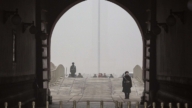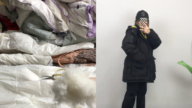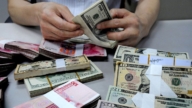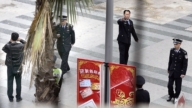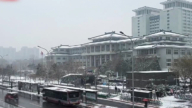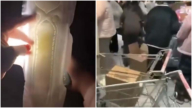【新唐人2011年2月16日訊】從毒奶粉、毒疫苗,到毒玩具、毒建材等等,中國製造的問題產品,已經成為全球消費者的心腹之患,這些毒害人類的產品,是在甚麼樣的規則下生產出來的,美籍商人孟天的新書《黑心帝國》,揭露了其中的黑幕。
與中國大陸製造商週旋十多年的美籍商人孟天,2月14號在「2011臺北國際書展」展出了他的新書—-《黑心帝國—中國製造業第一手全揭秘》,孟天在新書發佈會上,講述了他在大陸的工作經歷和寫作動機。
孟天:「很多人在中國做生意,眼光太短,他們今天騙你,你告訴他:如果你今天騙我,我明天不要跟你做生意。他說:今天是今天,我們明天再說。」
擁有華頓商學院MBA學位,又會說華語的孟天,多年前到中國華南地區幫忙外商做危機處理,在中國製造業工作期間,曾和廉價藥妝連鎖店、比利時鑽石商及紐約廢紙回收業者等,數十家歐美公司及數百家中國製造廠商合作,過程中看盡了中國黑心工廠的作為與邏輯,也體會出很多與中國工廠的相處之道。
孟天認為,共產黨統治下的中國,政治環境的不確定,造成了中國商人不講信譽—-「眼前能賺就賺」的生存邏輯。
孟天:「可能是他們的政治系統問題(造成的),因為政治是不可靠的,共產黨要改變想法,要改變法律,他們可以抓你,改變法律,然後你沒辦法。共產黨有很大的權力在中國,老百姓沒辦法,」
《黑心帝國》揭露了中國出口製造業的各種詭計,掀開了中國製造商的重重內幕,也詳細描述了外國廠商,在中國所碰到的商業、文化雙重撞擊與挫敗。
孟天認為,他寫的這本書可以幫忙做生意的外國人了解大陸的情況,也可以給擔心中國製造品質量的父母當參考資料。
孟天在《黑心帝國》中寫道,外國進口商與大陸工廠間的關係就像「貓捉老鼠」,客戶越是要求品質,供貨廠商的反彈就越強﹔工廠的品管人員會在產品貼上品管貼紙,但外國客戶還是得找自己的檢查人員到現場檢查才會放心。
對於大陸黑心商品背後的結構性問題,孟天比較了中國和美國,他說,在美國,一個製造業者向銀行貸款投入生產,是以十年、二十年為期,慢慢償還﹔但相對的,中國的業者,卻會努力的趕在三、四年內就回收。
孟天說,在其他國家,商人只要按法律做事就沒有問題,而在中國,共產黨可以隨便改變規則,比如,你現在投資了房子,他們突然告訴你現在有稅,現在有新規定,不能買第二個房子,現在的規定是這樣…那樣…,所以中國商人會為眼前的利益不擇手段。
《黑心帝國–中國製造業第一手全揭密》原書以英文撰寫,在臺北發表的繁體字版本,由《中央社》主任編譯賴秀如翻譯。
新唐人記者 周玉林 李若琳 綜合報導
“Poorly Made In China” reveals dark secrets of Chinese manufacturing
The recent scandals about Chinese products from
tainted milk powder to contaminated toys
have raised global concerns.
Paul Midler』s new book “Poorly Made in China”
reveals the dark secret behind Chinese manufacturing.
After dealing with Chinese manufacturers for
over a decade, American businessman Paul Midler
presented his new book “Poorly Made in China:
An Insider’s Account of the Tactics Behind China’s
Production Game” on Feb 14, at the 2011 Taipei
International Book Fair.
He spoke about his experience
and motivation behind the new book.
Midler: “Many Chinese businesses are short-sighted.
You tell them: if you lie to me today, I won』t do
business with you tomorrow, and they』ll say:
today is today, and we don』t care about tomorrow.”
A fluent Chinese speaker with an MBA from Wharton
Business School, Paul Midler came to Southern China
to assist foreign companies with crisis management.
During his stay in China, he has assisted companies
of all sizes in a diverse range of industries, working
directly with hundreds of manufacturers in China,
and gained a profound understanding
of Chinese manufacturing.
Midler thinks, the instability in China under
the CCP regime caused a lack of trust
among Chinese businesses.
“Making money right now” becomes the survival rule.
Midler: “It may be caused by their political system,
because politics are not reliable.
If the CCP wants to alter the law,
they can change the law and arrest you.
There is nothing you can do.
The CCP has all the power in China,
and the people are helpless.”
“Poorly Made in China” reveals various inside tricks
in China』s export manufacturing industry, depicting
the frustration experienced by foreign companies.
Midler believes that his book can help foreigners
do business in China and give the parents who worry
about the quality of Chinese products some reference.
Midler wrote that foreign importers and Chinese
manufacturers often play a game of “cat-and mouse.”
The higher the quality standard,
the more resistant the manufacturers become.
Even with the quality sticker,
the products cannot be trusted
unless importers run quality tests themselves.
Midler compared China and the U.S. on a structural
level. In the U.S., manufacturers usually pay back
bank loans over 1-2 decades; while in China,
manufacturers often try to pay back in 3 or 4 years.
In other countries, there would be no problem
as long as companies abide by the law. But in China,
the CCP can change the rules at will. For example,
you buy a house today,
and then they tell you there』s a new tax,
or a new rule forbidding buying a second house.
The current rule is like this, or that…
So Chinese businesses will do anything
for immediate profit.
“Poorly Made in China” is written in English.
Its Chinese version is published in Taipei, translated by
Lai Xiuru, chief translator at the Central News Agency.
NTD reporters Zhou Yulin and Li Ruolin.



